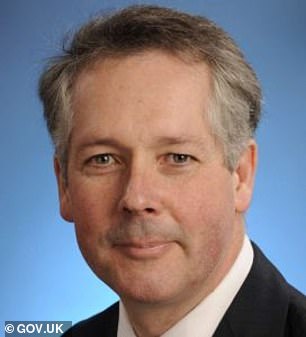Cancer-stricken Public Health England official with two years to live slams ban on assisted dying as ‘inhumane’ and reveals he would like the option of an ‘extra vial of morphine’ in his final days
- Professor Paul Cosford is the emeritus medical director of Public Health England
- The 57-year-old, who was incurable lung cancer, has only up to two years to live
- His biggest fear around dying is the ‘lack of control’ he will have in his final days
Professor Paul Cosford is the emeritus medical director of Public Health England
One of Britain’s top health officials has revealed he now supports assisted dying after developing incurable lung cancer.
Professor Paul Cosford, the emeritus medical director of Public Health England, said he would like the option of an ‘extra vial of morphine’ in his final days.
The 57-year-old has only another one or two years to live and described the current ban on assisted dying in the UK as ‘inhumane’.
Writing in the British Medical Journal, Professor Cosford said his biggest fear around dying is the ‘lack of control’ he will have in his final days.
He wrote: ‘The option of a prescription to allow me, in my last days, to bring forward the end of my life is simply not there.’
He added that he sometimes hoped he died from Covid-19 instead, as it would be a ‘quicker and kinder option’.
Professor Cosford said: ‘My biggest fear around dying is the lack of control. The lack of ability, if all becomes too much, to advance the end a little, to take some control in my final days.
‘I might have a diamorphine pump at that time, and the idea of having an extra vial in the fridge for me to use if I need it is appealing.
‘But I know it cannot be prescribed legally for this purpose so is not really an option. Despite helpful conversations with excellent palliative care specialists, this final element of choice and self-determination seems to evade me.’
Professor Cosford said his experience of lung cancer had caused him to change his views on euthanasia.
He had previously believed the law was ‘too blunt an instrument to deal with the complexities’ of death, but was now convinced it must be reviewed.
All forms of assisted dying are illegal in the UK, and can result in up to 14 years in prison.
But assisted dying has been legalised in several countries including the Netherlands, Switzerland, Belgium and Canada.
Campaigners who argue for the ban on assisted dying to be overturned in the UK have been met with significant opposition from doctors, religious groups and MPs. Parliament has consistently voted against changing the law.
Professor Cosford wrote: ‘We need to set aside entrenched positions on each side of the debate and look openly at the problems faced by people at the end of their lives.
‘We need to understand why rational, law abiding people sometimes feel compelled to travel to Switzerland for such care, often not telling their families why they are going. And we need to understand why their loved ones are sometimes prosecuted afterwards for helping them. Surely this tells us that our current arrangements are inhumane.’
Professor Cosford detailed the deterioration in his quality of life as his cancer progresses and said he would have less concern about dying if he knew assisted suicide was an option.
He wrote: ‘I try hard not to, but inevitably I sometimes ponder how I will die… There are many unpleasant scenarios I can contemplate.
‘In some ways I hope it will be an infection that takes me, as that may be a quicker and kinder option. Perhaps, paradoxically, covid-19 or flu, which I have worked so hard to control over the years as a public health professional, will come to my aid.
He said: ‘My exercise tolerance, already much lower than before my cancer, is likely to reduce still further.
‘I already get out of breath walking uphill, and I can manage only a few miles on the bike instead of the several hundred I used to enjoy as an ultra long distance cyclist
Professor Cosford has had a distinguished career in public health and infectious diseases, and was involved in the UK’s response to Ebola ad the Salisbury poisonings.
He stepped down from his role as Director for Health Protection and Medical Director at Public Health England last year due to his illness. He now serves as emeritus medical director at the body, providing advice to the chief executive.
